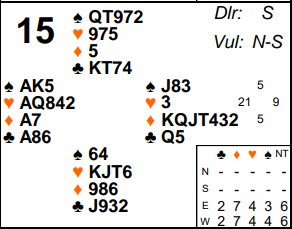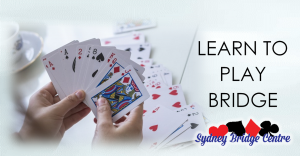City and Canada Bay – Thursday Morning 10th April 2025.

Board 15 last week had a good long suit opposite a strong balanced hand. That combination frequently makes slam a good prospect. This hand is no exception – 6♦ is excellent. Many pairs struggle to bid minor suit slams though – let’s see how it might be bid.
South will pass and West should open 2NT which is usually played as 20-22 balanced. Don’t worry about having a 5 card major – there are plenty of ways of finding a major suit fit. It’s much more valuable to get the general nature and strength of your hand across. Holding all 4 aces, no jacks, and a 5 card suit makes West’s hand extremely powerful – definitely worth more than the raw 21 points he has. Remember aces tend to be worth more than the standard 4 points and jacks tend to be worth less than the standard 1 point.
North isn’t going to wade in over 2NT with a poor hand vulnerable so it’s over to East. Because a 2NT opener can include a 5 card major, it’s quite common to play 3♣ here as 5 card stayman (sometimes also referred to as “puppet” stayman). The most common responses are 3♦ denies a 5 card major but shows a 4 card major (you can then continue to see if you have a 4-4 major suit fit), 3M shows 5 of that major and 3NT denies either a 4 or a 5 card major. There are lots of variants to this, and different continuations as well – see advanced section for more. East might start with 3♣ to initially look for a 5-3 spade fit but partner’s 3♥ response soon puts paid to that idea.
However, East’s hand here is really about diamonds. His hand might be worth very little if diamonds are not trumps (imagine if his side was missing the ♦A – the opponents can hold it up and then, unless either the ♠J or ♣Q is an entry, his hand might then be worthless).
So East really wants to explore a possible slam in diamonds. A good way to do that is to give up on the 5-3 spade fit but bid 4♦ immediately over 2NT. That should show a strong diamond suit with slam interest. West needs a way to say he’s not interested and 4NT should be used for that. Note – not as Blackwood! It’s usually better for the hand with more shape to use Blackwood – he knows what gaps he needs to fill. The big balanced hand has already described a lot about his hand so should let partner take control.
On this hand West should be happy to show interest over 4♦ as he has so many controls. He can start with 4♥ which should be a cue bid (when partner bids 4♦ he is saying he’s only interested in diamonds or no-trumps so he won’t care that West happens to have 5 hearts). East can’t do anything more at that point since he has no black suit controls so he will bid 5♦. But West should raise to 6♦ as he is the one looking at all those aces and his partner can’t know he has all of them! But even if West didn’t have all the aces there’s another reason why it’s still likely to be right to raise to 6♦ – see advanced section for why.
How about the play? In diamonds there are a number of options. Declarer can lead towards the ♣Q (or run an opening club lead from South round to his ♣Q) with the hope North has ♣K. That will allow him to later discard his spade loser on ♣A. Or he can try a heart finesse which also allows a black suit loser to be discarded. Lastly he can aim to set up the 5th heart as a winner as well – which he can do by trumping hearts in the East hand. There are plenty of entries to the West hand to get back to it later. All of these things work on this hand.
In fact 7♦ can be made by finessing and then setting up the 5th heart. There’s another possibility to make 7♦ as well though – more advanced readers might want to see if they can see what it is?
On the hand though, worrying about the overtrick in 6♦ is not necessary. +920 would have scored almost a total top (1 pair made 6NT, 1 made 6♦, 3 went off in 6♦, and everyone else was in 3NT or 5♦).
Key points to note
Hands with a good long suit opposite a strong balanced hand are very powerful and frequently make slam.
Mentally upgrade hands with aces and downgrade those with jacks (aces tend to be worth more than the standard 4 points and jacks tend to be worth less than the standard 1 point).
At matchpoints don’t play 5 minor if at all possible. Particularly not if 3NT is likely to be making. You might as well try 6 minor which will nearly always score very well if it makes and won’t be much worse if it goes off.
Strong 2NT openers can frequently include a 5 card major and therefore playing 3♣ as 5 card (or puppet) stayman is common. More experienced pairs should then discuss continuations after that.
A bid of 4 minor directly over 2NT is useful to show slam interest in that suit. Opener can bid 4NT to deny interest (cue bid something to show interest). It’s normally better for a shapely hand to use Blackwood rather than the strong balanced hand.
More advanced
There are many variants of 5 card stayman used over 2NT. Some are designed to handle one problem shape for responder – 54xx. 45xx hands are not a problem as they can transfer to 3♥ and then bid 3♠ but that doesn’t work with 54xx as you’d have to go past 3NT after transferring to spades. One variant that handles this is sometimes referred to as “Muppet” stayman where the meanings of 3♥ and 3NT over 3♣ are reversed. 3NT shows 5 hearts and 3♥ denies any 4 or 5 card major. So now a 54xx hand can start with 3♣ and then has room to bid 3♠ over 3♥ in case partner has 3 spades. It works – provided of course both players remember it when it comes up! Other more complex variants involve changing the meanings of 3♦ and 3NT.
Continuations after 5 card stayman are also worth discussing. What’s now quite common after a 3♦ response is for responder to bid a 4 card suit they do NOT have. That’s to improve the chances of the big balanced hand being declarer which is generally what you want so that the opening leader has to lead round to it. But you do have to think about how to deal with hands with both majors, etc.
Then of course what do you do after you’ve bid 5 card stayman but not found a major suit fit? You might well have (as you do here) a good hand with a 5 or 6 card minor and want to explore above 3NT. A 4 minor continuation should generally be natural to try and explore bidding 6 minor. Again you can play 4NT by opener as showing no interest.
I also said there was another reason to raise 5♦ to 6♦. That’s the scoring. Playing matchpoints you should generally only play 5 minor as a last resort because 3NT scores so much better (10 tricks in NT is 430 and even 12 tricks in 5♦ is only 420). With a big hand where partner has shown interest there’s no way West can afford to stop in 5♦ because 3NT is almost certain to be making. So he might as well bid 6♦. The point to understand is that even if it fails he won’t have lost much. If he plays 5♦ for +400 or +420 he’s likely to score a near bottom when all the other pairs are scoring +430, +460 or +490. So playing 6♦ 1 off for -50 will just score the same bottom! But if 12 tricks are available now he’ll score +920 and get a near top. So 6♦ has a lot to gain and very little to lose. This is another reason why it’s good to play 4NT by opener as showing no interest over 4♦. It allows you the best of both worlds. Responder can pass it and the pair can still play the higher scoring no-trump denomination but having explored the possibility of slam first (maybe once in 10 years you might be unlucky and play 4NT -1 but 99% of the time it will be fine!)
Of course all that logic only applies at matchpoint scoring. It’s a completely different story at imps where +400 or +420 in 5♦ will only mean a loss of 1 or 2 imps to 430, 460 or 490 – which is largely irrelevant. So now you only want to bid 6♦ if you think it’s got a good chance of making.
7♦ can be made by a heart finesse and then setting the 5th heart up. But, on the layout here, it can also be made by a black suit squeeze on North. Declarer needs to have cashed the ♣A before the end game. Then East’s last cards should be ♠Jx, a trump and ♣Q. He plays the last trump and leaves West’s last 3 cards as ♠AK5. What can North do? He can’t hold ♣K and 3 spades so, assuming he keeps ♣K, he has to come down to only 2 spades – which means West’s lowly ♠5 will become a winner! Observe the need to get the ♣A out of the way first though – otherwise North could discard the ♣K in the ending and declarer wouldn’t be able to cash his ♣Q. This technique of cashing a blocking honour in advance of a squeeze is known as a “Vienna Coup”.
Understand, however, that this squeeze is purely academic interest. It just happens to work on this hand because spades are 5-2 so only North can guard the suit – but that’s pretty unlikely and not a line you would realistically choose to play for (the simple heart finesse is better odds!)
Julian Foster (many times NSW representative) ♣♦♥♠



